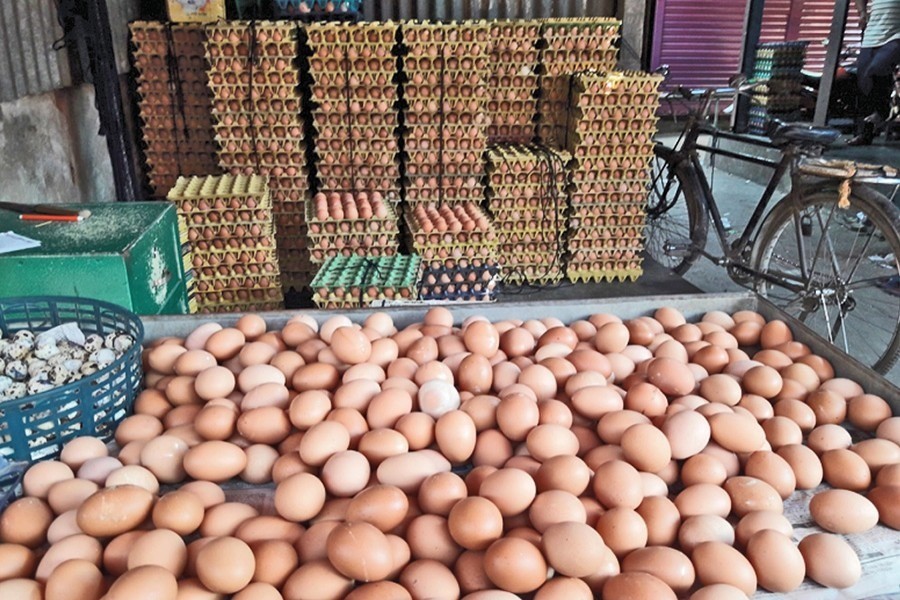Opinion
Low egg price during Ramadan means losses for farmers
The demand for eggs has fallen

Published :
Updated :

While consumers are happy with the low price of eggs, layer farmers are making losses.
Farmers are selling eggs to traders at Tk 8 per egg (or less), at a loss of roughly Tk 2 per egg. After changing hands, these eggs are being sold by retailers at about Tk 10 per egg.
Just a few months ago, in September and October 2024, there was an egg shortage. Many egg farms had been affected by floods, reducing the supply of eggs. At that time, small farmers were selling eggs at Tk 12 per egg or higher.
According to farmers in Narsingdi, the production cost of each egg is approximately Tk 10. Each egg is now being sold at Tk 8 because production is higher than demand. When the egg price was high a few months ago, many layer farms expanded and bought new layer chicks, and have now increased production. Increased supply of eggs seems to have led to a fall in price.
On the other hand, businessmen say that the demand for eggs is usually low during Ramadan, as eggs are not traditionally eaten at Iftar. As there has been significant inflation, purchasing power has also fallen, which has probably reduced the demand for eggs (and for many other consumer goods). Falling demand usually causes prices to fall.
Growers and traders say demand for egg usually decreases in the winter due to availability of winter vegetables, which can be eaten with rice as a substitute for eggs.
On 13 March, young entrepreneur Shah Alam (32) sold eggs for Tk 8.05 a piece from his farm, which holds 12,000 chickens, in Kamrabo of Shibpur upazila, Narsingdi. His production cost inclusive of feed, medicine, electricity, labour and return on investment would be Tk 10.30 a piece.
“We’ve made profit in the past two seasons, so some farmers started layer farming while some others expanded their capacity expecting good profit. I think increase in production leads to price fall, especially when demand has also decreased,” he told this author on 14 March. He added that many egg farms will not be able to continue production, if this low price continues.
On the low price of eggs, Director of Kazi Farms Limited Kazi Zahin Hasan said, “During Ramadan, consumers spend more of their food budget on traditional Iftar items like dates, chickpeas, Haleem and Jilapi. That means they must spend less on other foods like chicken and eggs, which are not traditionally consumed at Iftar. So the demand for chicken and eggs falls during Ramadan and the price also falls. This is seen almost every Ramadan.”
Hasan also explained that the price of chicken usually goes up about one week before the Eid holiday. He said, “People consume a lot of chicken during the Eid holiday. They know that it might be difficult to buy live chicken during the Eid holiday as many shops are closed. So they buy more chicken just before the holiday. The increase in demand for chicken usually causes an increase in price.”
Hasan also said that demand for eggs has also fallen because of inflation. “Inflation has reduced the purchasing power of the average family, which is probably why demand for eggs has fallen. The demand for many other consumer goods has also fallen.”
Faruk Mridha (35), who owns two farms of 3600 layer chickens and 2000 broiler chickens in Kundarpara. Shibpur, echoed the same sentiment expressed by other farmers due to the losses from poultry farming. “There is higher supply and lower demand during the Ramadan, so price falls. I am surviving with profits made earlier. But it is tough unless there is immediate change in price,” he said.
Touhiduzzaman, who sells eggs, pointed out that many farmers resumed production and new entrepreneurs have also come in, following reasonably good price of egg in the past two years. “As a result, production has increased and there has been a significant fall in price.” he said.
When the price of eggs was high, many government officers claimed that a syndicate had artificially increased the price. However, an economist would say that in a market like the egg market, where thousands of producers and traders sell eggs everyday, the price depends on supply and demand. When supply is higher than demand, price will be low; when demand is higher than supply, price will be high. It is obvious from the comments of stakeholders that the movement of prices is consistent with supply and demand.


 For all latest news, follow The Financial Express Google News channel.
For all latest news, follow The Financial Express Google News channel.